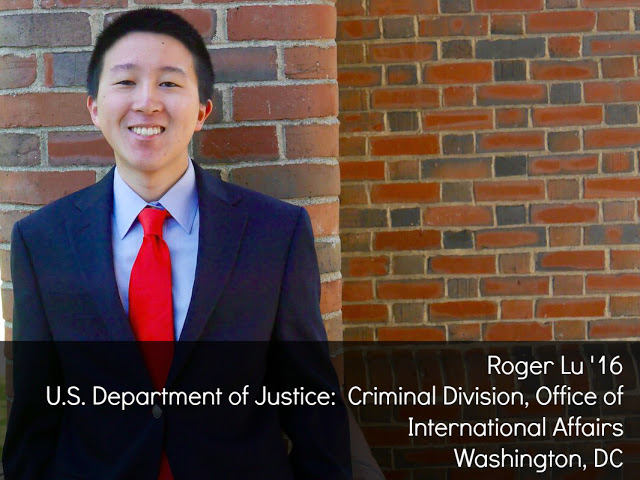- Public Policy
- Leadership
- Funding
- News & Events
- About the Center
Back to Top Nav
Back to Top Nav
Back to Top Nav
Back to Top Nav
Rockefeller Center-funded interns reflect on their experiences as part of our Notes from the Field series. The Rockefeller Center helps students find, fund, and prepare for a leave-term internship experience in public policy research, public policy analysis, issue evaluation, or activities which help shape and determine public policy.
 |
| Student Intern: Roger Lu '16 |
Internship Organization:
U.S. Department of Justice: Office of International Affairs
How would you describe your employer in one paragraph? What’s the elevator pitch?
The Office of International Affairs (OIA) liaises between the United States and foreign countries in matters of international criminal justice. The responsibilities of the OIA include coordinating fugitive extraditions and obtaining evidence or legal assistance from foreign countries in ongoing criminal investigations.
What are your specific responsibilities in the organization?
The OIA is broken down into geographic teams, and my team specializes in the UK and Commonwealth nations. I have been fortunate enough to work on a variety of interesting cases. Much of my work involves following up on extradition or mutual legal assistance requests either incoming or outgoing from the United States. This involves drafting different documents related to the extradition and mutual legal assistance requests. Since each case can be very different, it is interesting to be able to assist in the justice process fora variety of different types of crimes. Otherwise, I also communicate with foreign and domestic justice officials and prosecutors.
How did you feel on the first day of your internship?
The first day of my internship was very exciting, and I definitely felt like I jumped right into things. My team was great in teaching me the ropes, and on my first day, I was drafting referral letters for mutual legal assistance requests from a foreign country. My first day also coincided with a tour of the Main Justice Department building— it was really cool to see the big WPA-style murals and artwork, and it was wonderful to see the history behind the DOJ. I even got to see a stuffed bear, which was apparently an illegal hunting trophy that the Justice Department had seized from a poacher decades ago.
What is your favorite part of the internship so far?
My internship has been a great experience in teaching me about government, criminal law, and international relations. It is an amazing feeling to draft a referral letter and realize that it will be used to assist a U.S. federal prosecutor or a foreign law enforcement agent. It's even better when I get the chance to directly contact these U.S. and foreign officials to help coordinate some aspect of an extradition or mutual legal assistance request. I get the sense that I am really contributing to something greater.
What challenges have you faced so far?
One of my biggest challenges has been learning with all of the technical and legal terms related to criminal justice and international law. Even the basic mechanics of treaties and foreign legal systems can be daunting. I am so grateful to the attorneys, paralegals, and interns on my team for walking me through the basics of how governments interact in terms of legal cooperation. I also spent a good deal of time reading our internal guides and researching international criminal justice.
Broadly speaking, what do you hope to achieve by the end of your internship?
I hope to come away with a much greater appreciation and understanding of how governmental organizations work, and how big-picture legal concepts like international treaties on criminal justice are actually put into practice on a day-to-day basis. I already feel that I have a much better grasp of how international relations and diplomacy can play out in issues of legal cooperation, and how the seemingly simple process of one foreign government communicating with another can actually become a complex question of sovereignty and jurisdiction.
What have been some practical lessons you've learned in the day-to-day life of your internship?
I've learned the importance of being proactive in contacting my fellow interns to get lunch together. It can be easy to get drawn into the mindset of eating at your desk, but you're really missing out if you don't get to know your fellow interns! Things can get tricky since people are usually scattered on different floors and sometimes have different schedules, but it's definitely worth it to try and arrange lunches together. Otherwise, I’ve also picked up the importance of keeping an organized personal calendar to keep track of the different assignments and deadlines I’ve been given.